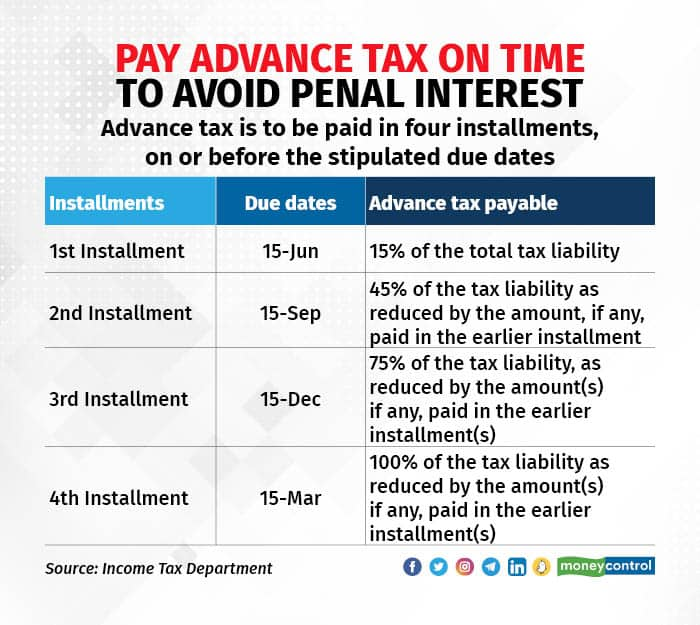



It is not uncommon for individual, salaried tax-payers to assume that advance tax payment is relevant only for those with huge tax liabilities or those with business income.
However, this misconception can land you in trouble if you do not pay advance tax when you are liable to. Put simply, any individual whose estimated tax liability is likely to exceed Rs 10,000 (after considering tax deducted and collected at source (TDS and TCS), in a financial year is required to pay advance tax through that year, as per Section 208 of the Income Tax Act. However, the income tax rules give senior citizens who do not draw any income from business or profession the leeway to not pay advance tax.
What is advance tax?
Essentially, it is the tax you pay before the end of the financial year, on income you earned in the same year. You have to make the payment in installments – June 15, September 15, December 15 and March 15 – instead of having to shell out the entire amount in one go at the end of the year.
In the case of salaried individuals, their employers deduct tax before depositing their salaries at the end of month. However, the fact is that they are likely to have other sources of income too – interest from deposits, capital gains made on sale of shares and mutual fund units and so on. Your advance tax liability calculations need to take these incomes into account as well.
Also read: ITR Forms FY 2023-24: Here’s what’s new in ITR-1 (Sahaj), ITR-4 (Sugam)

Advance tax payment in installments
Of your estimated advance tax liability, you have to pay 15 percent on June 15. By September 15, you should have paid 45 percent of the amount due; likewise, 75 percent by December 15 and 100 percent by March 15.
However, the rules are a bit different for self-employed businesspersons and professionals who have opted for the presumptive taxation scheme. While they too have to pay advance tax, they are entitled to certain concessions. They can make the payment at one go in the last quarter of the financial year, by March 15. This concession is extended as small businesses may find it difficult to estimate their advance tax liability at the beginning of the financial year.
Also read: Coming soon: March 15 is last deadline to pay advance tax
How to pay advance tax
To pay advance tax, you need to visit www.incometax.gov.in and register yourself, if you haven't done so already. Your PAN will serve as your user ID. Once you have registered, you need to log in and click on 'e-pay tax' under the 'Quick Links' menu on the left hand side of the portal. Follow the instructions on confirming your PAN, enter the OTP and proceed to select the right assessment year (2025-26 when you are paying advance tax for the financial year 2024-25) and 'Advance Tax (100) as the 'type of payment'. Click on 'Continue', enter the details and make the payment to complete the process.
Beware of non-payment penalty
Not complying with the advance tax payment rules will attract penalties. You will have to shell out simple interest at the rate of 1 percent per month on the amount of less-than-required payment/non-payment of advance tax by the due date, for the period till the amount is paid.
The penal interest applies (on the shortfall amount) only if the total advance tax paid is less than 12 percent and 36 percent of the advance tax due by June 15 and September 15 respectively. Similarly, the penalty will come into play if the advance tax you have paid is less than 75 percent and 100 percent of the amount due by December 15 and March 15 respectively.
Now, if you miss the March 15 deadline, you can still pay advance tax until March 31, but one month of interest as per section 234C of the Income Tax Act will be applicable.
However, if you happen to wait until July 31 (due date for filing ITR for the previous financial year) to meet this obligation, the I-T department will treat it as a default in advance tax payment. In such cases, you will have to pay an additional four months’ penal interest (1 percent per month) under Section 234B.
So ensure that you will fulfil the requirement by accurately estimating your tax liability and making the payment due before the deadline.
Discover the latest Business News, Sensex, and Nifty updates. Obtain Personal Finance insights, tax queries, and expert opinions on Moneycontrol or download the Moneycontrol App to stay updated!
Find the best of Al News in one place, specially curated for you every weekend.
Stay on top of the latest tech trends and biggest startup news.